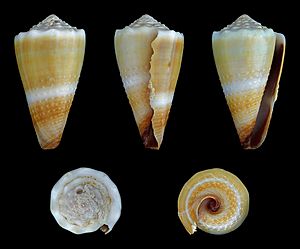Conus lividus facts for kids
Quick facts for kids Conus lividus |
|
|---|---|
 |
|
| Five views of shell of Conus lividus Hwass in Bruguière, J.G., 1792 | |
| Scientific classification | |
| Synonyms | |
|
Conus lividus, also known as the livid cone, is a fascinating type of sea snail. These snails are predators and live in the ocean. They belong to a group called gastropods, which are a kind of mollusc. You might know their family as cone snails or cone shells.
Like all species in the Conus genus, these snails are predatory and venomous. This means they have a sting that can be harmful to humans. So, it's very important to be careful and avoid touching them if you ever see one alive!
What Does it Look Like?
The shell of an adult livid cone snail is usually between 25 mm and 81 mm long. That's about the size of a small to medium-sized seashell you might find on the beach!
The top part of the shell, called the spire, is shaped like a cone. It has bumpy parts called nodules on its "shoulders." The lower half of the shell's main body has faint lines or grooves.
The shell's color can be light yellowish, fawn, or even olive to orange-brown. The bumpy parts on the spire and a band below the shoulder are white. There's also a single white band in the middle of the main body of the shell.
The opening of the shell, called the aperture, is narrow and purple. It has a faint white band in the middle. The very bottom of the shell and its inside are often a purplish color. The outer skin of the shell, called the epidermis, can look a bit tufted in rows.
Where Does it Live?
This cone snail can be found in many different places around the world. It lives in the Red Sea and in the Indian Ocean. You can find it near places like Aldabra, the Chagos Islands, the Mascarene Basin, Mauritius, Mozambique, Tanzania, and off the West Coast of South Africa.
It also lives all across the Pacific Ocean. In Australia, you can find it off the coasts of New South Wales, the Northern Territory, Queensland, and Western Australia.
What is its Home Like?
Conus lividus snails like to live around rocks and coral reefs. They prefer shallow water, which means you might find them closer to the shore.
Gallery
See also
 In Spanish: Conus philippii para niños
In Spanish: Conus philippii para niños





